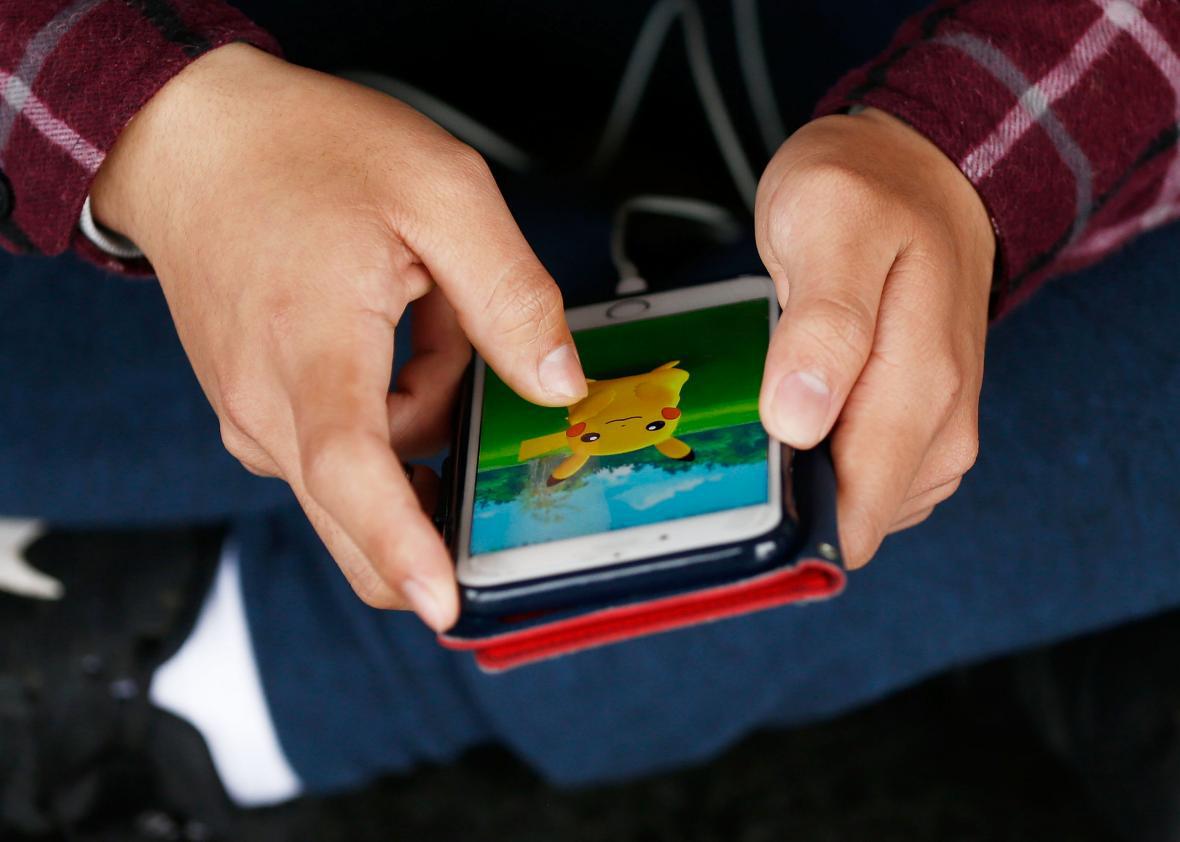Pokémon Go, Nintendo’s new augmented reality game for smartphones, seems primed for wordplay. Equal parts beloved and bemoaned, the overnight hit is smashing records, grabbing headlines, and even causing deaths. If you’re not playing Pokémon Go right now, you’re talking about Pokémon Go. It’s Pokémania out there.
But what has been less viral since Pokémon Go’s launch is precisely that: a lot more words like Pokémania. This is surprising, given our cultural appetite for blending and insta-commentary. Only a month ago Brexit blends choked social media like kudzu. Where’s the poképocalypse in Pokémongolia? Why aren’t we all talking about Pokémon portmanteaus?
It’s not for lack of trying. Plenty have attempted pokémanteaus. At a D.C. bar, you can order a round of Pokémongaritas. Friends and family might stage a pokevention for an addict. Pokémandering results in an unequal distribution of Pokémon in neighborhoods. A pokémontage shows off a player’s best captures. A Pokémon Go pro studies at a Pokémontessori school. Players unimpressed with the game, meanwhile, are letting out pokéyawns, saying it pokésucks. Citizens outraged by the ensuing public infestation lambaste the pokémorons. Doomsayers are trumpeting society’s pokémadness. Gamers devastated by slow servers have even threatened a pokéxit. The rest of us are simply asking, “What the pokéfuck is going on?”
All of these blends are funny, well-formed reactions to the Pokémon Go phenomenon, er pokénomenon. But they aren’t capturing our broader linguistic imaginations in the way, say, regrexit did. One immediate reason is familiarity. Many are still learning just what this foreign-feeling yet familiar-sounding word Pokémon is, let alone what any of these poké-blends are. As the name of the game, the creatures in it, and a whole media franchise, Pokémon is already working overtime. Dictionary.com recently added Pokémon to its online dictionary: Its entry is impressively concise for a word that requires explication more than definition.
Full blends of Pokémon are also hard to pull off—and overindulgent. As one tweeter provided in a wry spree: Pokémonster, Pokémonographed, Pokémonsoon, Pokémonsplaining, Pokémonday Night Football, and The Count of Pokémonte Cristo. These pokémongrels are clever but absurd contortions of word formation. They read more like Jeopardy’s cumbersome “Before and After” answers than anything meaningful or usable. They are the splitting headache of the Brexit hangover, the inevitable consequence of blending to excess.
The internal linguistics of Pokémon also poses challenges to wordplay. The word Pokémon cleanly snaps into poké- and -mon. The latter part, -mon, can swap with many rhymes; pokéyawn, and more acrobatically, pokémorons are examples. But -mon doesn’t carry enough information on its own, thus limiting blend supply. A zombiemon, say, doesn’t evoke a hunchbacked, Matrixed-in Pokémon trainer; it sounds like a crappy take on a Jamaican accent.
Then there’s the former component, poké-. English speakers, experts in polysemy, are unlikely to confuse it with a fish salad or Gumby’s sidekick. But should we pronounce it with a long E or schwa E? Do we include the accent mark or not? The choices affect what other words poké- sticks to. They also influence how we decode new combinations, especially in text: We approach pokefuck very differently than pokéfuck. And the very fact of choice might further deter wordplay in our fast-paced environments—or at least give us a moment’s pause, that rare filter of thinking before tweeting.
But it’s not just phonetic ambiguity that hamstrings Pokémon portmanteaus: It’s also unambiguity. Pokémon is an effective, successful, and distinctive brand name. Wordplay is in its DNA. Pokémon itself is a Japanese mashup of pocket monster. Its creatures names are mashups, too; Charmander splices together char and salamander, for instance. Blends are part of the vocabulary of gameplay. Players flock to catch PokéBalls in public PokéStops. Teams can compete at PokéGyms.
So, if -mon conveys too little information, poké- conveys too specific of information. Poké- is Pokémon. It’s unmistakable, but it’s branded, which hinders the spread of Pokémon wordplay. We tend to recoil from corporate portmanteaus. Framily (friends and family)? Frushi (fruit and sushi)? #PortmantNO, we revolt. These efforts reek of gimmicks, contrivance and pandering, of adding more din to our noisy lives, of passing off banality as originality. It’s also why Hillary Clinton’s own attempt at wordplay—“Pokémon Go to the polls”—felt forced and hollow, if adorably clumsy in its Marge Simpson squareness.
In our media-saturated lives, we’ve trained our noses to sniff out sales pitches. Otherwise catchy Pokémon Go portmanteaus—like a pokéconomy—still give off a stench, if faint, of capitalism. While many are still registering Pokémon as a new word, many are also registering it as a registered trademark, conjuring up, like Disney, its specific stories and characters, its world, its brand.
The ultimate test for any neologism or usage, finally, is its utility. What gap in the language does it fill? Brexit and the -exit libfix gave needed expression a particular political phenomenon. Will the game radically transform how we use smartphones or think of public areas? If so, then we might talk of Pokémoning a space like we do googling information. A few interesting contenders along these lines are pokébond, poképal, and pokéfriend, which some use to name a distinctively Pokémon Go–related experience: a new relationship or positive social interaction that came about from playing Pokémon Go.
For now, Pokémon wordplay is in keeping with the game: It’s cute, curious, and charming but ultimately encapsulated. For now, blends like pokéxit are a welcome bit of frivolity and disposability in a reality that feels much in need of augmentation these days. For now, Pokémon portmanteaus are—wait, you said there’s a Vaporeon where? Maybe we’re just too busy playing the game to play with its words.
